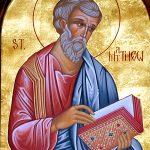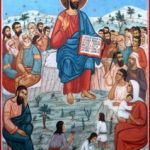The Beatitudes – Matthew 5:1-12
 This past summer I preached for the evening services at the Family Bible Camp at the Albright Park Camp & Retreat Center in Reed City, Michigan.
This past summer I preached for the evening services at the Family Bible Camp at the Albright Park Camp & Retreat Center in Reed City, Michigan.
It was a very natural place for me to be, and I was glad to preach there. I have a fondness for the tradition of the holiness camp meeting, and it felt right to be there preaching in that old tabernacle.
And, it occurred to me: why not preach on the Sermon on the Mount from Matthew? I remembered the importance of the Sermon on the Mount in the preaching of John Wesley, and I wondered if a series of messages suitable to a camp meeting could be delivered based on it. I think it went very well.
In an entry in John Wesley’s Journal dated October 19, 1739 he wrote:
At six almost the whole town (I was informed) came together, to whom I explained the six last Beatitudes; but my heart was so enlarged I knew not how to give over, so that we continued for three hours.
 The messages I gave didn’t go on for three hours (for which we can all be thankful), but I did find plenty of inspiration in the Sermon on the Mount, and in Wesley’s reflections on them. When I speak of a message that would be “suitable to a camp meeting” I mean: a series of messages stressing the idea of sanctification by faith. And, I wanted to connect the life and teaching of Jesus to this teaching — which (it seems to me) is so often drawn from the Pauline letters or from 1 John. I used Wesley’s thirteen sermons on the Sermon on the Mount for inspiration, but I did not follow them closely.
The messages I gave didn’t go on for three hours (for which we can all be thankful), but I did find plenty of inspiration in the Sermon on the Mount, and in Wesley’s reflections on them. When I speak of a message that would be “suitable to a camp meeting” I mean: a series of messages stressing the idea of sanctification by faith. And, I wanted to connect the life and teaching of Jesus to this teaching — which (it seems to me) is so often drawn from the Pauline letters or from 1 John. I used Wesley’s thirteen sermons on the Sermon on the Mount for inspiration, but I did not follow them closely.
It is a distinctive characteristic of Matthew’s Gospel that it contains large blocks of the teaching from Jesus: the Sermon on the Mount being the most memorable of these. It is helpful, as one goes along, to compare this with the less well-known Sermon on the Plain in the Gospel of Luke (Luke 6:17-49).
Matthew 5:1, 2
Ἰδὼν δὲ τοὺς ὄχλους ἀνέβη εἰς τὸ ὄρος, καὶ καθίσαντος αὐτοῦ προσῆλθαν αὐτῷ οἱ μαθηταὶ αὐτοῦ· καὶ ἀνοίξας τὸ στόμα αὐτοῦ ἐδίδασκεν αὐτοὺς λέγων·
“When Jesus saw the crowds, he went up the mountain; and after he sat down, his disciples came to him. Then he began to speak, and taught them, saying: ” (NRSV)
I’m told that this is normal for the times in which Jesus lived. The Jewish teachers sat when they taught. Nonetheless, I can’t help but be struck by the parallel here to royalty: Jesus is seated like a king on the Mount, his closest disciples around him — the Messiah (“anointed one”) instructing the crowds.
Matthew 5:3-5
Μακάριοι οἱ πτωχοὶ τῷ πνεύματι, ὅτι αὐτῶν ἐστιν ἡ βασιλεία τῶν οὐρανῶν. μακάριοι οἱ πενθοῦντες, ὅτι αὐτοὶ παρακληθήσονται. μακάριοι οἱ πραεῖς, ὅτι αὐτοὶ κληρονομήσουσιν τὴν γῆν.
“Blessed are the poor in spirit, for theirs is the kingdom of heaven. Blessed are those who mourn, for they will be comforted. Blessed are the meek, for they will inherit the earth.” (NRSV).
Here the common thread seems to be reversal. The announcement Jesus makes is “how fortunate are the poor… those who mourn… The meek…. The announcement immediately gets our attention because Jesus is remarking on the good fortune of people who are not generally considered fortunate.
And these verses teach us that the beatitudes should not be interpreted as prescriptions for blessing. They are not moralisms: do this and you will be blessed. Rather Jesus is announcing that the unlikely people are going to be blessed in the coming Reign of God. It is at this point that so many of the traditional commentators go wrong: Jesus said “blessed are the poor in spirit” so somehow I need to make myself “poor in spirit” (so what does that mean?); Jesus said “blessed are those who mourn” so… um, I should mourn over my sins, etc. But, what is really happening here is something different: Jesus is remarking on the good fortune of those who seem unfortunate. He is announcing a great reversal: he is announcing the good fortune of God upon the unfortunate.
And the translation “happy” seems especially inappropriate here. It’s not: “happy are those who mourn.” Rather, an announcement is being made: those who mourn now are going to be blessed in the coming Reign of God. And, I think, behind this is that wonderful conception of blessedness that we encounter in the Psalms. Yes, the translation of μακάριοι here is difficult: but there is a good argument in retaining either the original “blessed are…” or going to something like “how fortunate are…”
 And it helps to compare with Luke’s Gospel. Here it is “Blessed are the poor in spirit” there it is “Blessed are the poor.” Often in Old Testament scripture blessings are pronounced or promised to the poor. The prophet Isaiah says to the LORD: “You have been a refuge for the poor, a refuge for the needy in his distress, a shelter from the storm and a shade from the heat.” (25:4). So, it is here. A blessing of God is pronounced on the poor — and specifically those who have the attitude of the poor, the “poor in spirit.” Jesus’ ministry was especially directed toward the poor and the needy and the social outcasts of the day: “…the blind receive their sight, the lame walk, the lepers are cleansed, the deaf hear, the dead are raised, and the poor have good news brought to them.” (Matthew 11:5 NRSV).
And it helps to compare with Luke’s Gospel. Here it is “Blessed are the poor in spirit” there it is “Blessed are the poor.” Often in Old Testament scripture blessings are pronounced or promised to the poor. The prophet Isaiah says to the LORD: “You have been a refuge for the poor, a refuge for the needy in his distress, a shelter from the storm and a shade from the heat.” (25:4). So, it is here. A blessing of God is pronounced on the poor — and specifically those who have the attitude of the poor, the “poor in spirit.” Jesus’ ministry was especially directed toward the poor and the needy and the social outcasts of the day: “…the blind receive their sight, the lame walk, the lepers are cleansed, the deaf hear, the dead are raised, and the poor have good news brought to them.” (Matthew 11:5 NRSV).
A blessing is pronounced on “those who mourn” and on the “meek.” Given the context, I think πραεῖς (usually translated “meek”) here is just meant to signify the powerless — those who are not in positions of greatness in society. The word has gotten a lot of attention, because of its presence in this passage. But, in this context, I think it just means to refer to those without social power.
And what are these underdogs promised — the kingdom of heaven, comfort, the earth. The promise of future (or, it might be better to say: dawning) salvation is theirs. Jesus is announcing a great reversal which is being inaugurated through his ministry.
Matthew 5:6-9
μακάριοι οἱ πεινῶντες καὶ διψῶντες τὴν δικαιοσύνην, ὅτι αὐτοὶ χορτασθήσονται. μακάριοι οἱ ἐλεήμονες, ὅτι αὐτοὶ ἐλεηθήσονται. μακάριοι οἱ καθαροὶ τῇ καρδίᾳ, ὅτι αὐτοὶ τὸν θεὸν ὄψονται. μακάριοι οἱ εἰρηνοποιοί, ὅτι αὐτοὶ υἱοὶ θεοῦ κληθήσονται.
“Blessed are those who hunger and thirst for righteousness, for they will be filled. Blessed are the merciful, for they will receive mercy. Blessed are the pure in heart, for they will see God. Blessed are the peacemakers, for they will be called children of God.” (NRSV).
Here things seem to shift. Whereas before, the point was that the unlikely were being blessed by God, here Jesus talks about the character traits of those who are blessed by God. Hunger and thirst symbolize strong desire. I suppose in a nation where water is at the tap and food is readily available, the symbolism loses its force a bit. But, hunger and thirst are overwhelming impulses when they are real. This is the kind of desire for righteousness Jesus is talking about — a powerful, overwhelming desire. This is more than curiosity. This is more than a casual seeking. This is a hunger for God’s will and God’s justice. It seems to me that the term “righteousness” (δικαιοσύνη) conveys that which is rightly aligned with God’s will and purpose. Righteousness always suggests right relationship. Jesus pronounces a blessing on those who hunger to see things in this world rightly aligned with God’s will. That means their own lives — and it means the world around them.
Whosoever then thou art, to whom God hath given to “hunger and thirst after righteousness,” cry unto him that thou mayest never lose that inestimable gift, — that this divine appetite may never cease. If many rebuke thee, and bid thee hold thy peace, regard them not; yea, cry so much the more, “Jesus, Master, have mercy on me!” “Let me not live, but to be holy as thou art holy!” No more “spend thy money for that which is not bread, nor thy labor for that which satisfieth not.” Canst thou hope to dig happiness out of the earth, — to find it in the things of the world? O trample under foot all its pleasures, despise its honors, count its riches as dung and dross, — yea, and all the things which are beneath the sun, — “for the excellency of the knowledge of Christ Jesus,” for the entire renewal of thy soul in that image of God wherein it was originally created. Beware of quenching that blessed hunger and thirst, by what the world calls religion; a religion of form, of outside show, which leaves the heart as earthly and sensual as ever. Let nothing satisfy thee but the power of godliness, but a religion that is spirit and life; thy dwelling in God and God in thee, — the being an inhabitant of eternity; the entering in by the blood of sprinkling “within the veil,” and sitting “in heavenly places with Christ Jesus.”
It is the merciful (ἐλεήμων) who are blessed of God. These are those who are capable of feeling for others — of entering into their feelings — and giving them aid. And, God’s mercy is shown toward those who are merciful to others. It is the pure in heart who are blessed of God. God desires truth in the inmost heart — a people who speak to truth to themselves and others. Psalm 15:2 speaks of “those who walk blamelessly, and do what is right, and speak the truth from their heart….” (NRSV). The pure in heart, not only see themselves properly, they are enabled to see God.
Adam Clarke quotes this passage from Origen:
God has no body, and therefore is invisible: but men of contemplation can discern him with the heart and understanding. But A DEFILED HEART CANNOT SEE GOD: BUT HE MUST BE PURE WHO WISHES TO ENJOY A PROPER VIEW OF A PURE BEING.
It is the peacemakers (εἰρηνοποιός) who are blessed of God. These are people who actively seek peace and reconciliation. These are people who seek harmony and understanding — and though their efforts attempt to achieve it. It is often hard to be the reconciler. Yet, because God desires peace — not simply in the sense of a cessation of hostility, but in the sense of harmony, wholeness and well-being — that these people can rightly be called children of God — people whose lives display God’s character. “It is well known,” says Wesley, “that εἰρήνη, in the sacred writings, implies all manner of good; every blessing that relates either to the soul or the body, to time or eternity.”
Matthew 5:10-12
μακάριοι οἱ δεδιωγμένοι ἕνεκεν δικαιοσύνης, ὅτι αὐτῶν ἐστιν ἡ βασιλεία τῶν οὐρανῶν. μακάριοί ἐστε ὅταν ὀνειδίσωσιν ὑμᾶς καὶ διώξωσιν καὶ εἴπωσιν πᾶν πονηρὸν καθ᾿ ὑμῶν [ψευδόμενοι] ἕνεκεν ἐμοῦ. χαίρετε καὶ ἀγαλλιᾶσθε, ὅτι ὁ μισθὸς ὑμῶν πολὺς ἐν τοῖς οὐρανοῖς· οὕτως γὰρ ἐδίωξαν τοὺς προφήτας τοὺς πρὸ ὑμῶν.
“Blessed are those who are persecuted for righteousness’ sake, for theirs is the kingdom of heaven. Blessed are you when people revile you and persecute you and utter all kinds of evil against you falsely on my account. Rejoice and be glad, for your reward is great in heaven, for in the same way they persecuted the prophets who were before you.”(NRSV).
 And, the last section of the beatitudes is pronouncement of blessing on those who are persecuted for the sake of God’s Reign — God’s will and purpose. As such, it is also a warning of persecutions to come. Adam Clarke remarks:
And, the last section of the beatitudes is pronouncement of blessing on those who are persecuted for the sake of God’s Reign — God’s will and purpose. As such, it is also a warning of persecutions to come. Adam Clarke remarks:
They are happy who suffer, seems a strange saying: and that the righteous should suffer, merely because they are such, seems as strange. But such is the enmity of the human heart to every thing of God and goodness, that all those who live godly in Christ Jesus shall suffer persecution in one form or other. As the religion of Christ gives no quarter to vice, so the vicious will give no quarter to this religion, or to its professors.
So, those who have a devotions to Christ’s cause must take the long view: they must see beyond the immediate response to the message, they must have confidence that God’s purposes will prevail. And, Jesus reminds them that the prophets — who spoke a true word from God — were also persecuted in their day. There is a great reward from God promised to those who hold fast to the truth in spite of opposition. In 2 Corinthians 6:4-10 the apostle Paul speaks of his own ministry in these terms: “but as servants of God we have commended ourselves in every way: through great endurance, in afflictions, hardships, calamities, beatings, imprisonments, riots, labors, sleepless nights, hunger; by purity, knowledge, patience, kindness, holiness of spirit, genuine love, truthful speech, and the power of God; with the weapons of righteousness for the right hand and for the left; in honor and dishonor, in ill repute and good repute. We are treated as impostors, and yet are true; as unknown, and yet are well known; as dying, and see—we are alive; as punished, and yet not killed; as sorrowful, yet always rejoicing; as poor, yet making many rich; as having nothing, and yet possessing everything.”
These pronouncements of blessing are Christ’s way of introducing his message on the essence of Kingdom living — what it means to live under the reign of God.
So, as I said, I went to Albright Park Camp this past summer and preached in the evenings from the Sermon on the Mount. It seemed to be appropriate to me. After all, that is what camp meeting is for: to consider what it means to live under the Reign of God — to challenge one another to renewed faithfulness.
I opened up the series by asking this question: how hungry are you?














“Each of the eight Beatitudes is composed of two sentences joined by a coordinating conjunction. In most translations, the conjunction used is “for”. This choice shows a causal relationship between the two sentences. Blessed are the _____________ for (because) … and then the benefit is explained.
This parallel structure qualifies a certain behavior in the first half. Then, in the second, that qualification is explained and foretells a future state of being.”
Excerpt From: Mike Stair. “Be Attitudinal.” iBooks. https://itun.es/us/fBu8y.l
The danger with this approach is seeing the Beatitudes as therefore “prescriptions for blessing.” (as I discussed above.) They are (in my opinion), rather announcements of who God is blessing.
“ I view the passage not as a textbook, but rather as an authoritative guidebook. This passage of scripture reveals the rewards of obedience to its precepts and explains the burdens of disobedience. It is alive with the Spirit of God, wielding power to change the lives of those who respond to it. ”
Excerpt From: Mike Stair. “Be Attitudinal.”